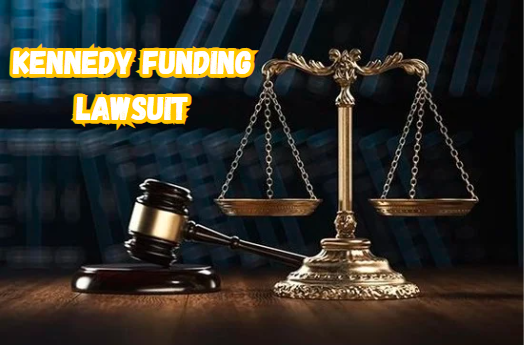The “Kennedy Funding lawsuit” is a tale of real estate, broken promises, and legal battles that has captured the attention of the lending world. This intricate case involves allegations of misconduct, financial disputes, and a complex web of legal challenges that have significant implications for borrowers, lenders, and the real estate industry as a whole.
In this article, we will delve deep into the Kennedy Funding lawsuit, providing a detailed analysis, unique interpretations, and insights that go beyond the surface-level information available online.
Introduction to Kennedy Funding
Kennedy Funding is a prominent direct private lender based in Englewood Cliffs, New Jersey. Specializing in providing bridge loans for commercial real estate transactions, the company has built a reputation for offering quick, flexible financing solutions.
Over the years, Kennedy Funding has facilitated numerous high-profile deals, often stepping in where traditional banks have hesitated. However, its practices have also drawn scrutiny, leading to several legal disputes, most notably the Kennedy Funding lawsuit.
Background of the Kennedy Funding Lawsuit
The Kennedy Funding lawsuit revolves around allegations of broken promises and financial misconduct in the lending process. Borrowers have accused the lender of failing to uphold their end of the deal, resulting in significant financial losses. These allegations have led to a series of legal battles, shedding light on the practices and operations of Kennedy Funding.
Key Parties Involved
- Kennedy Funding: The defendant in the lawsuit, accused of failing to provide promised funds and engaging in deceptive practices.
- Borrowers: Plaintiffs who claim to have suffered financial harm due to Kennedy Funding’s actions.
- Legal Teams: Representing both sides, the legal teams play a crucial role in navigating the complexities of this case.
Detailed Analysis of the Allegations
The Kennedy Funding lawsuit involves several key allegations, each of which highlights different aspects of the lender’s operations. Let’s explore these allegations in detail:
Allegation 1: Failure to Fund
One of the primary complaints against Kennedy Funding is the alleged failure to provide promised funds. Borrowers have reported that despite fulfilling all contractual obligations, Kennedy Funding did not disburse the agreed-upon loan amounts. This failure to fund has left borrowers in precarious financial positions, unable to complete their real estate transactions.
Allegation 2: Misrepresentation
Borrowers have also accused Kennedy Funding of misrepresenting the terms and conditions of their loans. This includes providing misleading information about interest rates, loan terms, and repayment schedules. Such misrepresentations have reportedly led to unexpected financial burdens for the borrowers.
Allegation 3: Excessive Fees and Charges
Another critical issue raised in the Kennedy Funding lawsuit is the imposition of excessive fees and charges. Borrowers claim that Kennedy Funding levied unreasonably high fees, often not disclosed upfront. These charges have exacerbated the financial strain on borrowers, contributing to their overall grievances.
Legal Proceedings and Developments
The Kennedy Funding lawsuit has seen numerous legal proceedings, each contributing to the evolving narrative of the case. Here, we outline the key developments:
Initial Filing and Early Hearings
The lawsuit was initially filed by a group of borrowers who alleged significant financial harm due to Kennedy Funding’s actions. Early hearings focused on establishing the validity of the claims and setting the stage for a more detailed examination of the evidence.
Discovery Phase
During the discovery phase, both parties exchanged crucial documents and information. This phase was pivotal in uncovering internal communications and documents that provided insights into Kennedy Funding’s operations and decision-making processes.
Testimonies and Expert Witnesses
Testimonies from borrowers, Kennedy Funding representatives, and expert witnesses have played a significant role in shaping the case. Expert witnesses, particularly those with expertise in real estate and lending practices, have provided critical analyses that have influenced the court’s understanding of the issues at hand.
Court Rulings and Judgments
The court has issued several rulings and judgments throughout the course of the lawsuit. These rulings have addressed various motions and objections raised by both parties, gradually building the framework for the final resolution of the case.
Impact on the Lending Industry
The Kennedy Funding lawsuit has had far-reaching implications for the lending industry. It has prompted a closer examination of private lending practices and highlighted the need for greater transparency and accountability. Here, we discuss the broader impact:
Increased Scrutiny on Private Lenders
The lawsuit has led to increased scrutiny on private lenders, with regulatory bodies and industry stakeholders calling for more stringent oversight. This heightened scrutiny aims to protect borrowers from potential misconduct and ensure fair lending practices.
Reforms and Regulatory Changes
In response to the issues raised by the Kennedy Funding lawsuit, there have been calls for regulatory reforms. Proposed changes include stricter disclosure requirements, caps on fees and charges, and enhanced borrower protections. These reforms aim to create a more equitable lending environment.
Lessons for Borrowers
For borrowers, the Kennedy Funding lawsuit serves as a cautionary tale. It underscores the importance of thorough due diligence when selecting a lender and emphasizes the need for clear, transparent communication throughout the lending process. Borrowers are encouraged to seek legal advice and fully understand the terms of their loans before proceeding.
Unique Interpretations and Insights
While the factual details of the Kennedy Funding lawsuit are crucial, it’s equally important to consider the broader implications and insights that can be drawn from this case. Here, we provide our unique interpretations and analyses:
The Balance of Power in Lending
The Kennedy Funding lawsuit highlights the inherent power imbalance between lenders and borrowers. Private lenders, like Kennedy Funding, often hold significant leverage, which can be exploited to the detriment of borrowers. This case underscores the need for more balanced power dynamics in the lending industry.
The Role of Ethical Practices
Ethical practices in lending are not just a moral imperative but a business necessity. The fallout from the Kennedy Funding lawsuit demonstrates how unethical behavior can lead to legal challenges, reputational damage, and financial losses. Lenders must prioritize ethical conduct to maintain trust and credibility in the market.
The Importance of Legal Recourse
The ability of borrowers to seek legal recourse is a critical aspect of ensuring accountability in the lending industry. The Kennedy Funding lawsuit showcases how legal action can serve as a powerful tool for addressing grievances and promoting fair practices. It also highlights the need for accessible legal resources for borrowers.
FAQs
Q: What is the Kennedy Funding lawsuit about?
A: The Kennedy Funding lawsuit involves allegations of broken promises, financial misconduct, and deceptive practices by the private lender Kennedy Funding. Borrowers have accused the lender of failing to provide promised funds, misrepresenting loan terms, and imposing excessive fees.
Q: Who are the key parties involved in the Kennedy Funding lawsuit?
A: The key parties include Kennedy Funding (the defendant), borrowers who have filed the lawsuit (the plaintiffs), and the legal teams representing both sides.
Q: What are the main allegations against Kennedy Funding?
A: The main allegations include the failure to fund promised loans, misrepresentation of loan terms, and the imposition of excessive fees and charges.
Q: How has the Kennedy Funding lawsuit impacted the lending industry?
A: The lawsuit has led to increased scrutiny on private lenders, calls for regulatory reforms, and heightened awareness of the need for transparency and accountability in lending practices.
Q: What lessons can borrowers learn from the Kennedy Funding lawsuit?
A: Borrowers are encouraged to conduct thorough due diligence when selecting a lender, seek legal advice, and fully understand the terms of their loans to avoid potential pitfalls and financial harm.
Conclusion
The Kennedy Funding lawsuit is a complex and multifaceted case that has significant implications for the lending industry. Through a detailed examination of the allegations, legal proceedings, and broader impact, we gain valuable insights into the challenges and opportunities within the private lending sector.
This case serves as a reminder of the importance of ethical practices, transparency, and accountability in fostering a fair and equitable lending environment. As the legal battle continues, the outcomes will undoubtedly shape the future of private lending and provide critical lessons for all stakeholders involved.



